| Srl | Item |
| 1 |
ID:
132326
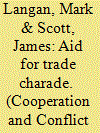

|
|
|
|
|
| Publication |
2014.
|
| Summary/Abstract |
Aid for Trade (AfT) has gained prominence as an innovative form of donor support in the 'post'-Washington Consensus. AfT mechanisms have been praised as a means of aligning trade liberalisation deals (whether in the Doha Round or within bilaterals) to poverty reduction objectives. This article, through critical analysis of AfT discourse within the 'moral economies' of multilateral World Trade Organization and bilateral European Union-African, Caribbean and Pacific negotiations, points to the strategic purposes of donor language in rationalising asymmetric North-South trade systems. Moreover, it questions the 'development' credentials of AfT assistance by examining some of the ensuing private sector activities and the impact on the supposed beneficiaries, and the tying of AfT disbursements to the implementation of inappropriate policies.
|
|
|
|
|
|
|
|
|
|
|
|
|
|
|
|
| 2 |
ID:
142839
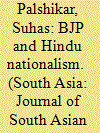

|
|
|
|
|
| Summary/Abstract |
Will the BJP pursue its Hindutva ideology while in power or will it now gradually become a ‘centrist’ party? Responding to this question, the present paper argues that the possibility that it would transform into a centrist party is rather dim for four reasons: 1) the mixing of Hindutva identity with the development agenda during the national election campaign in 2014; 2) the mild and covert pursuit of Hindutva by both party and government; 3) the dynamic, but deep-rooted relationship between Hindutva and the BJP; and 4) most importantly, the slow and imperceptible shifting of the middle ground of public opinion in India in favour of majoritarian (and therefore pro-Hindutva) sentiment.
|
|
|
|
|
|
|
|
|
|
|
|
|
|
|
|
| 3 |
ID:
136058
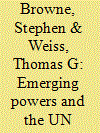

|
|
|
|
|
| Summary/Abstract |
The importance of emerging powers in the UN development system is undeniable, but their influence over the shape of the post-2015 agenda is less clear. This article examines recent survey data by the Future UN Development System (funds) Project in order to better gauge the perceptions of the problems and prospects.
|
|
|
|
|
|
|
|
|
|
|
|
|
|
|
|
| 4 |
ID:
131356
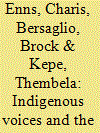

|
|
|
|
|
| Publication |
2014.
|
| Summary/Abstract |
This paper explores recent efforts to ensure the participation of indigenous peoples in the making of the post-2015 development agenda. It is based on an examination of the UN's global consultation process, conducted between July 2012 and July 2013. Using discursive analysis of consultation findings and reports, we argue that the UN's approach to participatory development represents a pretence rather than an actual shift in power from development experts to the intended beneficiaries of development. Therefore the post-2015 consultation process aptly illustrates the recurring tyranny of participation, this time at a global level, as the UN maintains control over global development goals. Recognising that it would be unjust to ignore the ability of marginalised groups to challenge the UN's dominant narratives of development, we suggest that there is still time for indigenous voices to be heard in the build-up to the post-mdg era through 'invited' and 'uninvited' forms of participation.
|
|
|
|
|
|
|
|
|
|
|
|
|
|
|
|
| 5 |
ID:
133654
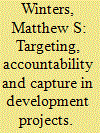

|
|
|
|
|
| Publication |
2014.
|
| Summary/Abstract |
If development projects are to be effective, a minimum requirement is that the funding reaches its intended destination. Yet the history of international development is replete with examples of this not happening. I argue that there will be fewer problems with corruption or other diversions of funding-which I jointly label capture-in more precisely targeted projects. More well-defined targeting results in superior accountability relationships because there is greater clarity of responsibility, clearer information about outcomes, and improved identifiability of stakeholders. I use an original cross-country, cross-project data set on the incidence of capture in World Bank-funded investment projects to test the theory. The data show a negative relationship between targeting and capture, and I demonstrate that this relationship is robust to a variety of specifications. In addition, I find that there is a higher baseline likelihood of project capture in countries perceived as more corrupt according to commonly used survey-based measures from Transparency International and the Worldwide Governance Indicators, cross-validating those measures and my own
|
|
|
|
|
|
|
|
|
|
|
|
|
|
|
|
| 6 |
ID:
127150
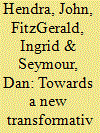

|
|
|
| 7 |
ID:
137742
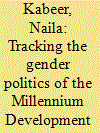

|
|
|
|
|
| Summary/Abstract |
This article tracks the gender politics of the processes that led to the adoption of the Millennium Development Goals and that continued to feature in subsequent policy debates. It suggests that this politics is rooted in tensions between conceptualisations of rights and capabilities that characterised the preceding decade. While feminist organisations made major gains on women’s rights during 1990s, it was a narrow version of human capabilities that defined the MDGs. Feminist efforts since then have focused on defending sexual and reproductive rights in the face of the attacks mounted by an ‘unholy alliance’ led by the Vatican and supported by a shifting group of countries and religious groups. This has led to the relative neglect of the economic injustices associated with the dominant market-led model of development.
|
|
|
|
|
|
|
|
|
|
|
|
|
|
|
|